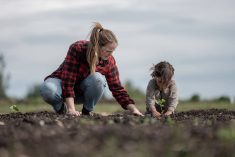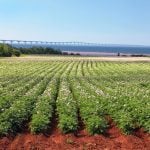At first glance, you’re convinced that Nightingale Farms must have some kind of Midas touch. Everything here must always work out exactly according to plan. After all, how else could this family farm have grown to over 1,000 acres of fresh vegetables in the middle of the Norfolk sand plain, former home to Ontario’s decimated tobacco industry?
If not for some kind of crystal ball, how else could the Nightingales be shipping 35 million pounds of fresh produce a year, making them one of the country’s largest local suppliers to food chains, independents, and Ontario Food Terminal brokers? How else could they be running everything from greenhouses to packing and distribution systems, and expanding into the U.S.?
Read Also

Building a farm legacy that outlasts you
A farm’s legacy isn’t just about the land; it’s also about the values and the impact that continue long after the current owner has stepped away.
Bill Nightingale doesn’t buy a word of it.
None of it has been easy, Bill Sr. says. It’s taken — and continues to take — equal and massive doses of fortitude and humility. It’s taken a strategy based on a strong core business, and it’s taken stringent analysis and great timing, the same as it would for any kind of farming.
More than anything, it’s taken the nerve to take risks and to keep on taking them, even though you know you won’t wind up on the upside every time.
For the Nightingales, innovation is their lifeblood. It’s the heart of their business strategy, and if that sounds hackneyed and trite, like the sort of thing you’d say about any farm or business, take a closer look.
This is a farm with its own R & D department. It’s a farm that actively and systematically sources new ideas, analyzes the results and then figures out how to transfer successful technologies to new environments.
With an eye on their main goal of extending their growing season, this approach has catapulted their farm business, and it has also attracted a lot of attention. In 2007, the farm won the provincial Premier’s Award for Agri-Food Innovation Excellence.
Passion drips from Bill Sr. when he talks about the farm’s history of innovation, and it intensifies as he moves on to describe their current projects, but he keeps coming back to their main rationale, which Bill sums up in a simple handful of words.
“We’d rather be the first ones with the new technology,” Nightingale says.
Nightingale, however, is just as quick to admit that not all their ventures are hits. “That’s just part of the business of farming today,” he says.
This attitude is what sometimes separates exceptional farmers from good ones. “They not only believe in the necessity of making mistakes, they see mistakes as virtually synonymous with growth and progress,” says Danny Klinefelter, agricultural economist at Texas A&M and director of The Executive Program for Agricultural Producers (TEPAP) for 22 years.
Through his TEPAP work, Klinefelter has come to know some of the most amazing farmers and ranchers in North America, and he says he has developed one key take-home. In order to thrive in farming, Klinefelter says, it’s going to take more than being good at controlling costs, keeping good records and having a sound marketing plan.
“In this rapidly changing world, in order to stay ahead, the internal rate of change in the business needs to exceed the rate of change in the business’s external environment,” Klinefelter says. “If it doesn’t, the business is falling behind even though it may be moving forward.”
If the farm has never seen failure, says Klinefelter, the farmer hasn’t been pushing hard enough.
But, he adds, there are two essential attributes that must accompany such risk taking. First, always do your research before diving in, says Klinefelter.
Second, never pay twice for the same mistake.
Analyze
Top farmers consistently spend serious time monitoring and analyzing performance, Klinefelter says. They pick up on problems and opportunities earlier than other farmers, and they aren’t just good, they’re highly skilled at thinking in terms of multiple frames of reference. They also don’t ask “who” caused the problem, they ask “why.”
It all means that such farmers are more likely to treat the cause and not just the symptoms of any problem, which means they’ve learned how to repeat successes, not failures.
Besides, by not always trying to attach blame, they tend to engage everyone in the organization in continuous analysis, Klinefelter says. “They’re also more likely to hear what they need to hear, not just what employees think they want to hear.”
This is especially important for farms like Nightingale Farms that rely on employees. The Nightingales’ payroll carries 250 to 300 people, mostly offshore workers on top of the 30 full-time staff in middle management.
Bill Sr. and Bill Jr. continually analyze the financial contribution of each crop and try to react to it without emotion or ego, learning as they go.
Other farms may say they do the same thing, but the Nightingales make it much more structural than most.
“We continually look at every number, and if it’s not making money it has to go or we have to fix it,” says Bill Sr., the farms’ CFO. “Each crop is micromanaged,” he says. “In the fresh produce game, there’s no room for error.”
That also means that the Nightingales are ready to walk away from decisions that aren’t working out.
A few years ago, as an example, the Nightingales set up an organic warehouse and distribution centre with enough space to subcontract other organic producers in the area. After recently reviewing the financial performance of this entity, they decided to downsize. “We couldn’t afford the risk,” says Bill Sr.
The volatility in organic demand and supply was simply too great. Retailers buy as needed, not based on special organic production contracts. The Nightingales knew that going in, but they found the unpredictability was getting even worse than when they first got into the venture. Conditions had changed, and it was time to wrap it up… without regret and without blame.
“For large-scale production there simply isn’t enough strength in the market,” Nightingale summarizes. But what’s right for Nightingale Farms isn’t necessarily right for other farmers, he quickly adds. In fact, he believes the organic market is still good as a niche, particularly for small-scale farmers selling limited amounts directly to consumers.
“Maybe 10 or 20 years down the road it (the organic market) will grow but for now it’s too risky,” says Nightingale. “We’ve decided to trim it back.”
Now they handle just their own certified organic production through their warehouse, paying extra attention to managing input costs and waste.
Learn from mistakes
Successful farmers generally make more mistakes than the average, Klinefelter says. It’s because they’ve made more decisions and tried more things that others haven’t done before.
However, these farmers are also quicker to recognize and fix their mistakes and cut their losses, and they are faster to capitalize on their successes.
“One measure of success is not whether you have tough problems to deal with… everyone has problems… but whether your problems are the same as last year,” says Klinefelter. ”
Since the mid-80s the Nightingales have been trying different ways to extend the duration of the local growing season. They also wanted to control moisture loss and to capitalize on the superior drainage and higher soil temperatures of Norfolk’s sandy soils. Relative to other parts of Canada, crops mature earlier here with better disease control and increased yields and quality.
Finding, developing and using ways to extend the season is a goal of the farm.
In 1981, Bill Sr. was one of the first producers to use plastic mulches, which meant he was able to grow cantaloupes that ripened in July. Previously, they had only been able to sell into the peak period in late August. Cantaloupes are best when they’re ripened in the heat, not in the cool nights at the end of summer.
Basically there was no larger-scale commercial production of cantaloupe in Canada so by using plastic mulch the Nightingales instantly became the largest commercial cantaloupe grower in Canada.
Then they started trying plastic mulch with other crops. “We were doing it (plastic mulch) seven years before anyone else was thinking or doing anything about it,” says Nightingale.
The Nightingales were also among the earliest adopters of drip irrigation to water the roots and temper the risk of frost. The Nightingales also adopted low tunnels, various crop covers, and a series of crop monitoring systems.
Then in 2004 Bill Sr. spent six weeks in Europe looking for new ideas, knowing that the farmers there were ahead of Canada. When he saw 20,000 acres of fresh vegetables flourishing there under high tunnels, he was convinced the idea would help grow a better product and produce higher yields back in Ontario, and he brought seven and a half acres of tunnels home to set up.
It was such a success that the next year he learned how to manufacture the tunnels to better withstand our climate and continued to expand their tunnel acreage. Now, they’re able to produce various tender crops from April through to the end of October with lower fixed costs than greenhouses, which netted them the Premier’s Innovation Award.
Nightingale was so impressed with the technology, he formed a company called Tunnel Tech, to manufacture and market high tunnels to other growers in North America and the Caribbean. Today he sells them throughout North America for about $25,000 an acre, about 10 per cent of the cost of a greenhouse.
Timing
In Nightingale’s experience, the benefits of getting out ahead with the adoption of new technology can last about 20 to 25 years, but he’s concerned that in the Canadian fresh produce industry, the pipeline of new innovations may be stagnating.
Of course, that may just mean that there are opportunities elsewhere.
Klinefelter is enthusiastic about that kind of thinking. “Top managers are opportunistic,” he says. “They recognize that in business and in life, timing is everything.”
Knowing when to get in also means knowing when to get out or to reapply somewhere else. “This is going to become even more important as the rate of change becomes exponential rather than linear,” says Klinefelter. “Management experts call those moments at which sharp growth or sharp declines occur tipping points.”
These farmers have the ability to not only recognize existing contexts, but can visualize future contexts. “The most successful farm executives I’ve met don’t necessarily invent ideas, but they are able to put them in context and add perspective,” says Klinefelter.
That’s exactly what the Nightingales have done with their research and development.
Bill Jr., the farm’s next generation owner, is applying season-extending technology from southern Ontario to another geography. Under his guidance, over the last four years the farm has slowly expanded production into the southern U.S. They’ve been testing and adopting the frost-avoidance techniques imported from the north to produce fresh produce in the winter, including January, February and what Bill Sr. calls “The March Wall” period.
Every four or five years, Florida catches a killing frost during the winter months so farmers there simply don’t grow crops then. But the Canadians have a business advantage. With their high tunnels, mulch and drip irrigation, they already know how to survive and thrive during this high-risk period.
“Growers get less aggressive the further south you go,” says Bill Sr. “In Florida they farm like we did 20 years ago.” That’s because the climate is so good and they’ve had little grower competition from other areas.
Currently, the Nightingales are in the process of establishing about 100 acres of zucchini, peppers and eggplants as a base farm. Peak production is in March when produce in Canada is most expensive. Then they ship the produce north for grading and distribution via their on-farm warehouses. They use Canadian standards and have full control of the product quality and keep customer relationships year-round.
The Nightingales hope this will add economies of scale and enable them to attract and keep more committed employees who want to work all year long.
Their plan is to double their rented acres down south in the next few years. This is no small investment, with over a million dollars invested so far in establishing the new snowbird Nightingale farm. “There’s a margin of opportunity in Florida,” Bill Sr. says.
However, there’s also a whole new set of rules. They must learn how to farm in the south, where the states handle water, taxes and labour issues differently. There’s also more disease pressure, and no killer Canadian winter to stop the insect, weed and disease cycles.
Years ago, Bill Sr. learned firsthand how different geography and culture affects production when he spent three years trying to establish a Canadian International Development Agency project farm in Jamaica. He learned how difficult it can be to be a foreign owner and how important it is to have a network of friends that can help you find good resources at a competitive price.
“I learned that it’s the unknowns that kill you,” he says. “I paid the price to learn that it’s not feasible to farm in Jamaica unless you live there.”
But then, this goes right back to what Klinefelter preaches. It isn’t that top farmers never make mistakes, it’s that they don’t make them twice.
Now, Bill Sr. is helping his son apply in Florida the lessons that Bill Sr. learned in Jamaica. Key learnings include the need to transfer technology in increments, and to rely on their pool of foreign labour.
Like many top farmers, the Nightingales’ attempts to push the envelope by trying something different are calculated, managed risks.
Again, Klinefelter likes what he sees. “The best managers do their homework,” Klinefelter says. “They consider their options — complete with the possible pitfalls and traps — and they develop a strategy before any major undertaking.” CG














